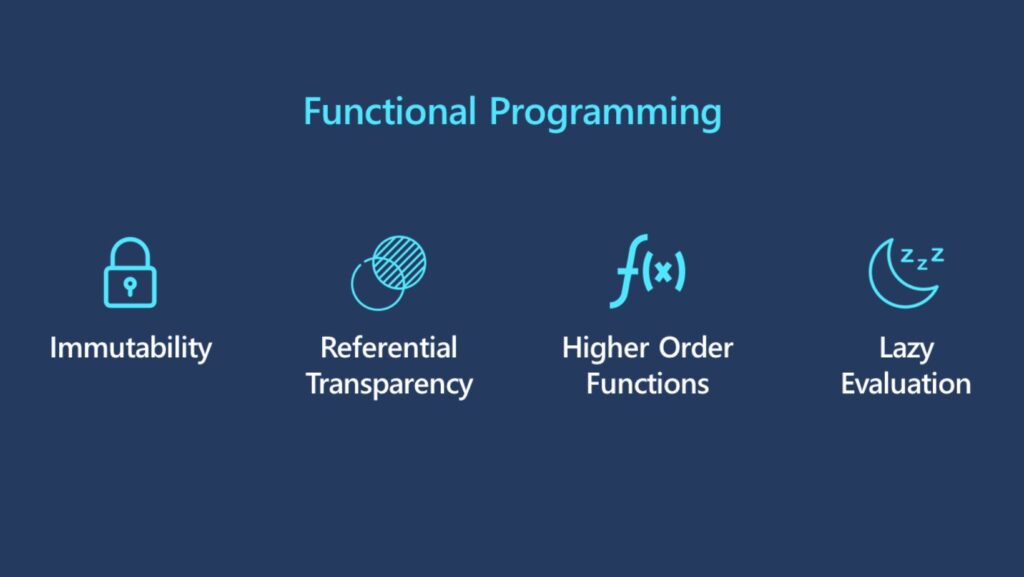Functional Programming
Functional programming is a paradigm that focuses on executing functions in a way that avoids changing state and mutable data. This approach emphasizes pure functions, which produce the same output for a given input without causing side effects. In my exploration of functional programming, I’ve come to appreciate its emphasis on immutability and declarative style.
One of the core concepts in functional programming is higher-order functions, which treat functions as first-class citizens. This means functions can be passed as arguments to other functions or returned as values, allowing for flexible and modular code. As I delved deeper into this concept, I found it to be a powerful tool for creating reusable components and enhancing code readability.
By embracing functional programming principles, developers can write code that is often more concise, predictable, and easier to test. The focus on data transformations rather than mutable state can lead to more robust applications with fewer bugs. Through my own experiences with functional programming, I’ve witnessed firsthand the benefits it brings to software development projects.

What is Functional Programming?
Functional programming is a paradigm that focuses on treating computation as the evaluation of mathematical functions. It emphasizes the use of PURE FUNCTIONS, which produce outputs based solely on their inputs without causing side effects. In functional programming, functions are FIRST-CLASS CITIZENS, meaning they can be assigned to variables, passed as arguments to other functions, and returned from other functions.
One key concept in functional programming is IMMUTABILITY. Data structures once created cannot be modified; instead, new data structures are created through transformation functions. This approach enhances CONCURRENCY and makes programs more predictable and easier to reason about. Functional programming languages like Haskell, Lisp, and Clojure embody these principles at their core.
By embracing higher-order functions such as MAP, FILTER, and REDUCE, functional programming enables developers to write concise and elegant code that is often more DECLARATIVE than imperative approaches. This leads to code that is easier to test and maintain over time. The use of RECURSION is also prevalent in functional programming for solving complex problems by breaking them down into simpler sub-problems.
Functional programming has gained popularity in recent years due to its suitability for developing scalable and fault-tolerant systems in domains like finance, healthcare, and telecommunications. Companies like Netflix and WhatsApp have adopted functional programming languages to build robust applications that handle large volumes of data efficiently. As software development continues to evolve, understanding functional programming concepts becomes increasingly valuable for modern developers seeking to enhance their skill set.
| Key Points | Details |
| Paradigm Focus | Evaluation of mathematical functions |
| Core Principles | Pure functions, immutability |
| Popular Languages | Haskell, Lisp, Clojure |
| Advantages | Concurrency support; predictability; maintainable code |
| Common Functions | Map(), Filter(), Reduce() |
| Industry Adoption | Finance; healthcare; telecommunications |
In conclusion I believe this section effectively introduces readers to the fundamentals of functional programming while highlighting its relevance in today’s tech landscape.

Benefits of Functional Programming
Functional programming offers a range of advantages that can enhance software development processes and improve overall code quality. Here are some key benefits to consider:
- Modularity: Functional programming promotes breaking down complex problems into simpler, reusable functions, enhancing modularity and facilitating easier maintenance and testing.
- Immutability: By emphasizing immutable data structures, functional programming reduces the risk of bugs caused by unexpected changes in state, leading to more predictable and reliable code.
- Concurrency: Functional programming languages often provide built-in support for managing concurrency, making it easier to write parallelized code without concerns about shared mutable state.
- Scalability: With its focus on pure functions and side-effect-free operations, functional programming can scale effectively to meet the demands of large-scale applications.
In addition to these benefits, functional programming encourages a more declarative style of coding where developers focus on what needs to be done rather than how it should be done. This approach can lead to clearer and more concise code that is easier to understand and maintain over time.
Overall, embracing functional programming principles can lead to more robust software solutions that are better equipped to handle evolving requirements in today’s fast-paced development environments.


